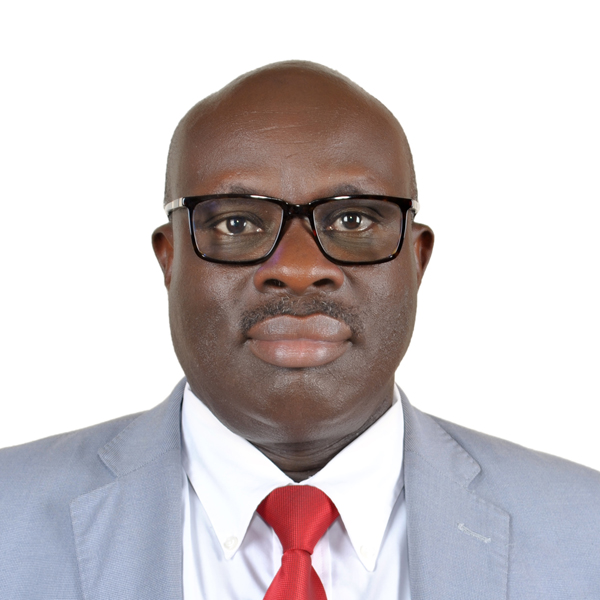Bridging Climate Science and Policy, with Sam Mugume
Sam Mugume, Commissioner at Uganda’s Ministry of Finance and incoming co-chair of the Coalition of Finance Ministers for Climate Action, shares his insights on the role of data-driven policy in tackling climate change. In this interview, he discusses the challenges African governments face in integrating climate data into decision-making and highlights how initiatives like C3A can help bridge the gap. He also reflects on real-world applications of climate analytics in Uganda and the innovations that will be critical for African policymakers in the coming decade. His perspective reinforces the value of science-informed fiscal leadership.
INTERVIEWEE
 Dr. Sam Mugume Koojo is a Macroeconomic Policy Analyst, Statistician, Researcher, Natural Resource Manager, and Development Planner. He currently serves as the Assistant Commissioner Macroeconomic Policy Department in Uganda and represents the Minister of Finance on the Coalition of Finance Ministers for Climate Action.
Dr. Sam Mugume Koojo is a Macroeconomic Policy Analyst, Statistician, Researcher, Natural Resource Manager, and Development Planner. He currently serves as the Assistant Commissioner Macroeconomic Policy Department in Uganda and represents the Minister of Finance on the Coalition of Finance Ministers for Climate Action.
QUESTIONS
Introduction: Can you tell us a bit about yourself and your background? What is your connection to C3A, and how does your role at Ministry of Finance of Uganda and incoming co-chair of the CFMCA align with its mission?
I come from a humble background in western Uganda, along the slopes of Mountain Rwenzori, from a large family of 15 children (8 males and 7 females). My early life was spent in the village, where I lived with my grandmother (may her soul rest in peace), who was a subsistence farmer. We enjoyed digging, brewing local beer from bananas, and collecting firewood for fuel. Despite our simple lifestyle, we had everything we needed, as nature provided for us.
As I grew up, I attended schools in towns that were vastly different from my early village life. I noticed that, although we were living what we considered to be a higher standard of living, we were not necessarily better off than in my village setting. Issues such as pollution, garbage management, noise, and the lack of food, energy for cooking and other needs were overwhelming. It was during this time that I truly began to appreciate the value of nature.
At university, I studied statistics, never imagining that I would eventually become an advocate for nature and the sustainable utilization of resources for economic development. However, later in my career, I found myself involved in studies of natural resource management and its economics, natural capital accounting, and the optimal utilization of resources for sustainable development, including macroeconomic modeling. This marked the beginning of my rekindled passion for nature and its preservation.
I have had the privilege of working with numerous aspects of natural capital, including being one of the few global experts for chimpanzee population counting. Now, in the later years of my career as a macroeconomic policy analyst within the Ministry of Finance, I am deeply involved in working with ministries of finance at a global level to ensure that natural capital and investments in climate change adaptation and mitigation are incorporated into fiscal policy decisions. This has been the pinnacle of my professional life.
How I wish we could have developed while preserving the setting of my early village life?
Given my background and the growing recognition of the impact of climate shocks on economies, there is a significant need for Ministries of Finance to understand how best to incorporate climate change parameters and natural capital within macroeconomic models. This need is particularly high in developing countries, especially in Africa, where assessing the impact of climate shocks on the economy both in terms of risks and opportunities is critical thus contributing to real world policy actions. C3A has the capacity and expertise to assist us in this area, which is why we are interested in partnering with C3A, both as a country and as co-chairs of the coalition. Additionally, C3A’s mission aligns with our strategic direction, both as a country and as a coalition, through the Helsinki Principles.
Bridging Science and Policy: C3A’s mission is to connect climate science with real-world policy actions. Based on your experience, what are the biggest challenges African governments, and more specifically Uganda, face in integrating climate data into decision-making, and how can initiatives like C3A help overcome them?
There are several challenges, but let me highlight three:
- Lack of High-Level Policymaker Appreciation: Many policymakers do not fully recognize that climate change is significantly affecting economic growth. They also tend to focus on short-term gains rather than long-term sustainability. As a result, this perspective hinders efforts to integrate climate issues into decision-making processes, especially those that require financing. C3A can assist in helping policymakers understand and appreciate the long-term benefits of investing in green economic development and sustainable economic growth.
- Inadequate Climate Related Data: There is a major challenge in the availability of sufficient climate-related data. C3A can support capacity development in this area, helping to improve the collection, analysis, and use of relevant climate data.
- Lack of Capacity and Expertise: Many Ministries of Finance lack the necessary capacity and expertise to develop and utilize analytical tools related to climate change and economic analysis. C3A can assist in training current Ministry of Finance staff and, more importantly, collaborate with local institutions of higher learning to ensure that future economic managers understand the implications of climate change and are equipped to use the appropriate analytical tools.
Climate Analytics in Action: You’ve been involved in applying climate analytics tools to support policy development. Can you share an example of a project where these tools made a significant impact on shaping climate policy or resilience planning?
One of the best examples we have in Uganda is the Nakivubo Channel Rehabilitation project. This channel is the largest in Kampala, draining through valleys and wetlands within the city all the way to Lake Victoria-the largest lake in Africa. For the past 15 years, the swamps and wetlands along this channel have been destroyed, and in some cases, people have settled in these areas. However, through a critical analysis of the benefits of protecting the channel for both Kampala city residents and the entire country, considering fiscal costs and benefits it was realized that we need to rehabilitate the wetland and implement appropriate protection measures. The decision was primarily informed by the high costs being incurred from continuing with "business as usual," compared to the benefits of restoring the wetland and its ecosystem services. Simple analytical tools with clear and understandable reports were used to reach this conclusion.
Looking Ahead: As climate challenges become more urgent, what emerging trends or innovations in climate science and analytics do you think will be most crucial for African policymakers in the next decade?
Many innovations will be necessary, but I think this one will stand out in the next decade. A better understanding of natural capital such as minerals, forests, land, water, and the ecosystem services they provide as crucial factors for determining the true value of a country's wealth, especially for resource rich countries. This needs to be approached strategically. Such an understanding will significantly inform countries' participation in agreements for carbon markets and other emerging climate action financing modalities. Additionally, spatial measurement of these resources will be essential to inform the best policies for investment and optimize the utilization of these resources.
